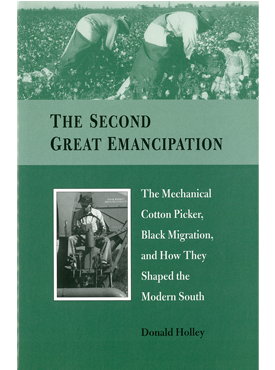In The Second Great Emancipation, Donald Holley uses statistical and narrative analysis to demonstrate that farm mechanization occurred in the Delta region of Arkansas, Louisiana, and Mississippi after the region’s population of farm laborers moved away for new opportunities. Rather than pushing labor off the land, Holley argues, the mechanical cotton picker enabled the continuation of cotton cultivation in the post-plantation era, opening the door for the civil rights movement, while ushering a period of prosperity into the South.
The Second Great Emancipation
The Mechanical Cotton Picker, Black Migration, and How They Shaped the Modern South
Donald Holley
July 2000
New in Paper April 2019
Available In:
Paper: $32.95 (978-1-68226-106-4)
Cloth: $42.95 (978-1-55728-606-2)
“Cogent, well-reasoned, and clearly written. Anyone interested in American agricultural and Arkansas history will find this book a must read.”
—Arkansas Historical Quarterly
“An engaging discussion of the push-pull debate about mass out-migration and technological change, inventors and the process of invention, and long-run structural change in an economy.”
—Journal of Economic History
“A fascinating history. . . . Students of the history of agriculture, Delta farm labor, the South, and especially the mechanical cotton picker will find Holley’s book to be an indispensible guide.”
—Agricultural History
“This is truly an outstanding study . . . a large and detailed look at a very important topic.”
—Gilbert C. Fite, Professor Emeritus of History, University of Georgia

